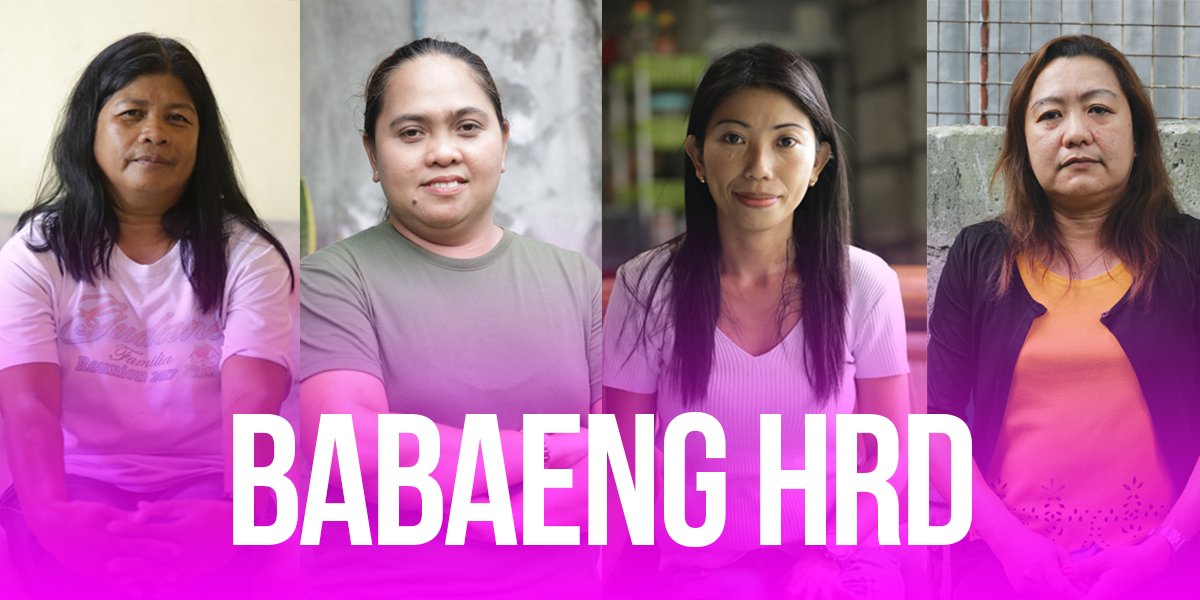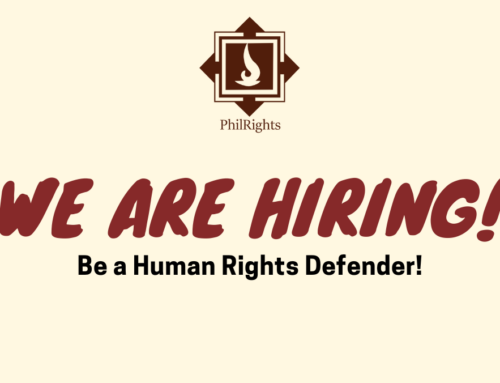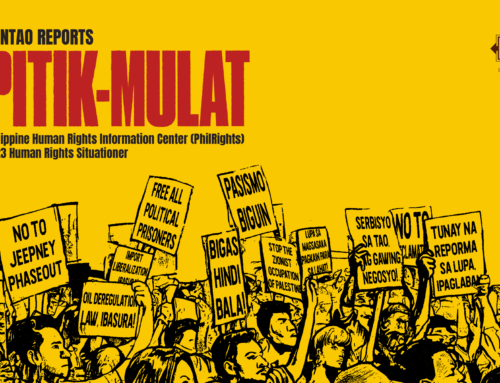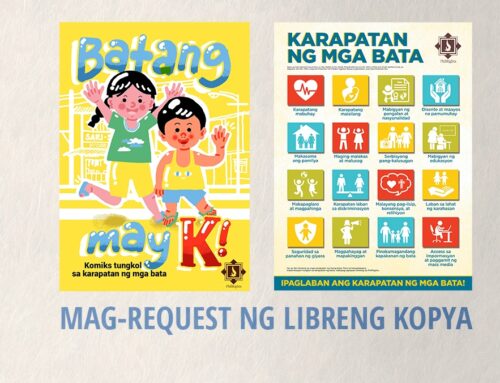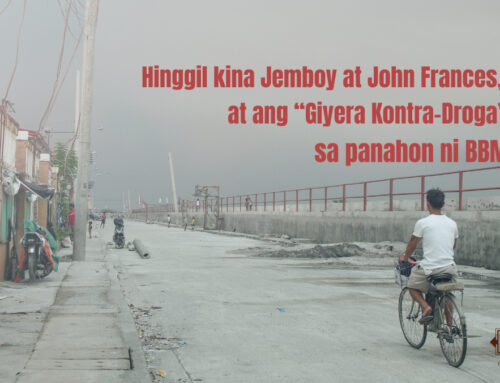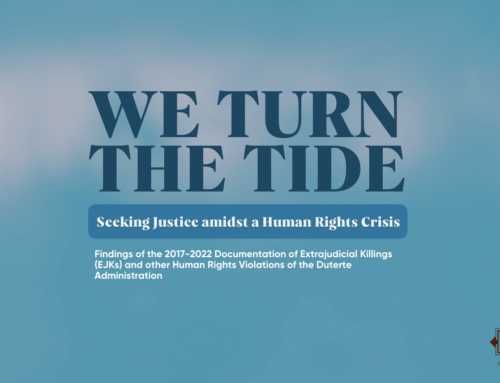by Diwa Villanueva and Luna Tapauan
This International Women’s Day, we pay tribute to brave women who rose to the challenge of promoting and protecting human rights in their communities. These are people who are bold enough to accept the risks of being women human rights defenders (WHRDs) in order to make change work not only for women but for their whole community.
Here are their stories.
Sally Salvacion

Sally Salvacion is an urban poor community leader. She has dedicated most of her life in helping people in their community–specifically on matters of housing and women empowerment. Her involvement in the human rights movement started when she became part of Kongreso ng Pagkakaisa ng Maralitang Lungsod (KPML) and then with Zone One Tondo Organization (ZOTO) when they were relocated in San Jose Del Monte City, Bulacan.
After two years of as a member, Sally became the Secretary and eventually, the Vice President of ZOTO Regional. This gave her the opportunity to attend training events and seminars which helped her gain more knowledge on human rights. Since then, Sally has become more invested in movements for women and for human rights. She began speaking up and encouraging her fellow community members to do the same especially when their rights are violated.
“Mula noon, kapag sa tingin ko naba-violate ang karapatan ng isang tao, ipinupush ko na magreklamo ka o mag-complain ka kasi hindi dapat ganyan ang nangyayari sa atin,” she recalled.
Sally also related that since they live in a relocation site, they experience problems with land and housing which is a burden—especially for women. This pushes her to motivate women to engage themselves in conversations and mobilizations regarding these issues. She often tells them: “Dapat tayong mga babae, hindi tayo laging nasa bahay lang… Hindi lang naman dapat iyon ang role ng mga babae, hindi ba? Dapat nakikilahok sa lahat ng issue at nakikipaglaban din.”
However, some women also ask Sally if they are rebels for challenging the status quo and for speaking up. To this Sally responded, “Iyong mga karapatan natin, dapat ipinaglalaban natin. Babae kasi tayo. Sinong makikipaglaban para sa atin? Role ng mga kababaihan yan… itaas iyong mga karapatan natin at i-empower ang ating mga sarili.”
Now, Sally is proud that women in their community are learning that they should partake in both local and national issues. One example is their opposition to the lowering of the minimum age of criminal responsibility and their continuous effort to empower their fellow women.
Sally and her organization also conducts training sessions
on lobbying work so that they will know how to push for the concerns of their community. They also provide women in the community with training on how to use computers, access social networking sites, and search online.
For Sally, these activities are important since women should not only be confined in the four corners of their homes. Indeed, they should be proactive on issues concerning their rights. “Ang panawagan ko, sana marami pang trainings, ma-motivate pa ang mga kababaihan, at mas makilahok sa mga issue,” she said.
Susan Balindo

Susan Balindo is a full-time Administration and Finance Staff at the Institute of Women’s Studies of St. Scholastica’s College. She is also a volunteer for Baigani Feminist Solidarity for Women and a member of the LGBT Ministry and the Education Ministry of the Most Holy Trinity Parish of Balic-Balic in Sampaloc, Manila.
Having been part of her parish’s Youth Ministry, Susan was already exposed to community issues, particularly on discrimination, violence, and abuse against women. This fueled her dream to join a non-government organization so she can contribute in the campaign to change the situation of women.
Throughout her work with her organizations, she has met widows, mothers, and children of victims of human rights violations whose experiences and current life situations have greatly impacted her commitment as a woman human rights defender. “Ang pangarap ko, ay maiba na ang tono nila [mga kababaihang namatayan ng mahal sa buhay dahil sa “War on Drugs”] na ‘Oo, biktima ako, pero andito ako ngayon, bumabangon, lumalaban,’” Susan shared.
Although the work challenges her personally, the secondhand grief and the limitations of the services she can provide for the families only strengthened her call to take action for women.
According to Susan, human rights work is a clear mission to make people—women in particular—aware of their inherent rights and dignity. For her, a woman’s approach to human rights work sets a different tone. As a WHRD, she is able to offer a safe space for other women to learn of their own capacities and potentials and to take part and contribute towards changing oppressive situations for women.
Susan calls on the government to recognize and respect women. She also asks the government to respect human lives: “Yung buhay ng tao, importante na maintindihan nila na hindi iyan parang manok o ipis na pinapatay lang.”
She wishes for the government to realize that while people are being killed, there will always be family members who will be left behind. There will be women who will carry the burden of supporting their families on their own.
“Habang pinapatay mo ang mga haligi ng tahanan, may babae na naiiwan kung saan siya ang bubuhay at mamomroblema sa pamilya o mga batang iniwan,” said Susan.
Cristina Orido

Cristina Orido is a full-time mother to her 12-year-old son and a homemaker. She is also an active member of Partido Lakas ng Masa (PLM) and the provincial leader of Piglas Maralita in Bulacan.
As a community leader, Cristina is a strong support system not only to her family but also to the people in their community. Her drive to help people whose rights are violated intensified when she witnessed a neighbor who was illegally arrested. She remembered the fear it brought to the victim and his family. This incident made her question what better way she can help as a community leader and woman human rights defender
“Ang nag-encourage sa aking maging parte ng human rights work ay noong may isang taong lumapit sa akin at umiyak sa harap ko. Nadama ko ang pangangailangan niya ng tulong,” Cristina related.
Human rights work has challenged Cristina to bring across the concerns of their community since there is a lack of support from other institutions in their community. She is aware of the gravity of the needs of the community but there are only few who are willing to work with them to protect the rights of the people.
Through her involvement in the human rights movement, Cristina was able to attend training events on human rights which she then shares with her community.
“Naituro ko na iyan sa kanila. Naibabahagi ko ang mga karapatan patungkol sa kanila,” she explained.
For Cristina, educating the people means equipping them with their valuable knowledge about their rights so they may become more vigilant against human rights violations.
Evelyn Cornelio

Evelyn Cornelio stopped working in the insurance industry so she can devote her time to the activities of the Most Holy Trinity Parish of Balic-Balic, Sampaloc, Manila. She is part of the Batayang Pamayanang Kristiyano (BPK) and currently serves as coordinator of the Human Rights (HR) Ministry of their parish—which started as a response to the rampant extrajudicial killings in their area.
The teachings of their parish priest sparked Evelyn’s interest in human rights work. She said: “Ang amin pong simbahan, hindi lang siya nagca-cater sa kung ano ang nangyayari sa loob ng simbahan. Community-based kami.”
They were told not only to focus on the liturgy and church activities but also to engage in their community—to go to the grassroots and familiarize themselves with the situation of their constituents.
Evelyn and her colleagues saw the impacts of the government’s anti-drug campaign in their community. They saw the burden the campaign has brought to women who are left behind by their husbands who were either killed or arrested.
This made Evelyn realize the vital role of human rights defenders in showing victims of human rights violations that they are not alone in their fight for justice. “Kung walang taong tutulong para makita ang mga karapatan natin, hindi sila talaga makikiisa. Takot ang mga taga-komunidad. Akala nila sila lang mag-isa para isulong kung ano ba iyong karapatan natin,” Evelyn exclaimed.
According to her, she and her colleagues in the HR Ministry might not be able to provide financially for the victims but what they can impart to these people are comfort and assurance that they have people whom they can lean on.
Evelyn recognizes that there will always be fear in doing human rights work. She realized that human rights defenders’ lives are always on the line but she also stressed that these fears should not hinder their efforts to help other people. “Huwag tayong matakot. Huwag tayong matakot na tumulong sa iba sapagkat ang laban natin ay hindi lamang laban ng isa kung hindi labang ng buong sangkatauhan,” Evelyn reminded.
WHRDs in the Philippines, and indeed, worldwide, face an uphill battle fraught with danger. Front Line Defenders, a Dublin-based HRD organization, reported that 321 HRDs lost their lives in 2018; thirty-nine percent of these are women. Despite these very real risks, women like Sally, Susan, Cristina and Evelyn put their lives on the line everyday as they persist in pushing forward the cause of human rights for women and their communities.
Their hard work demands our attention, protection, and support.



